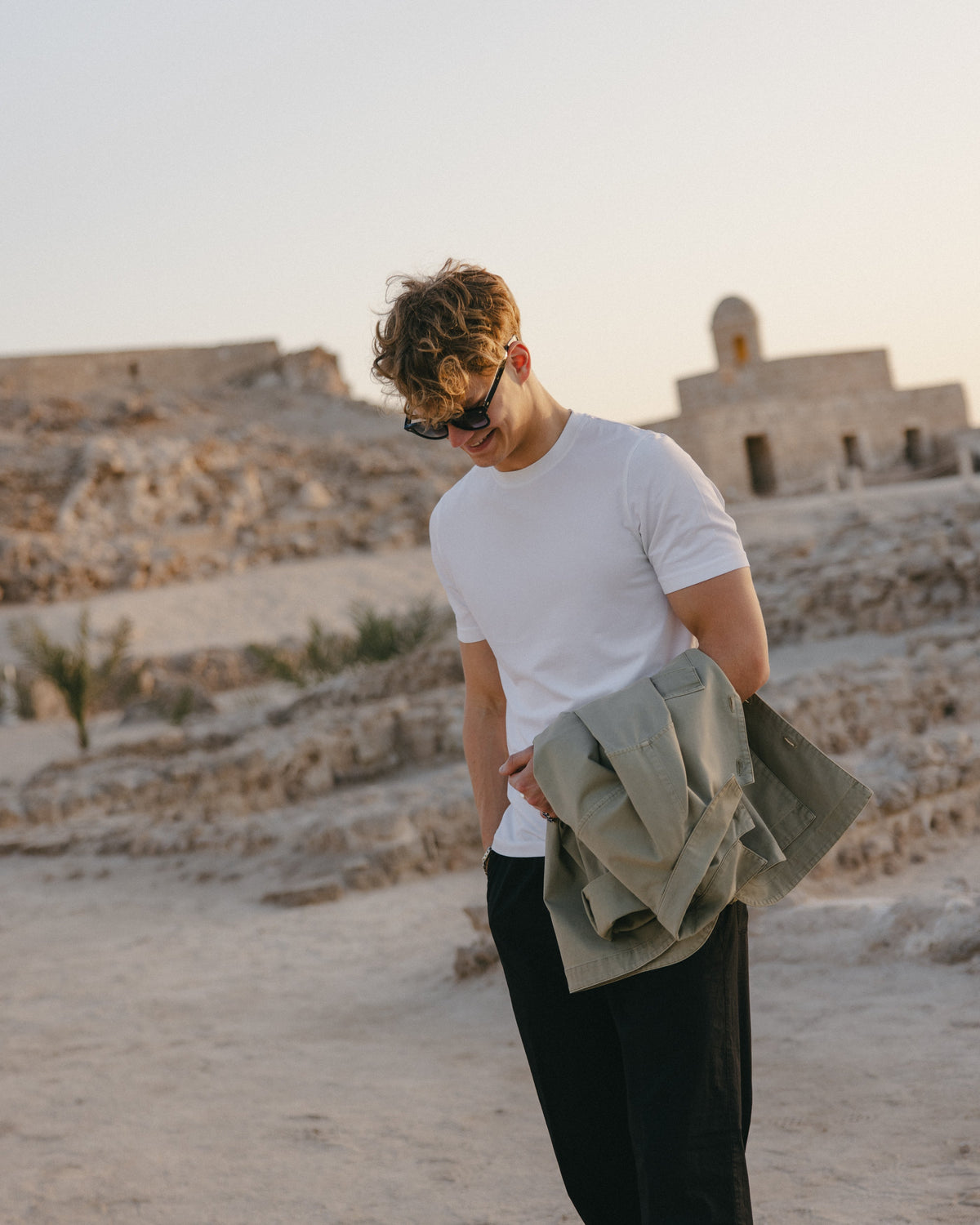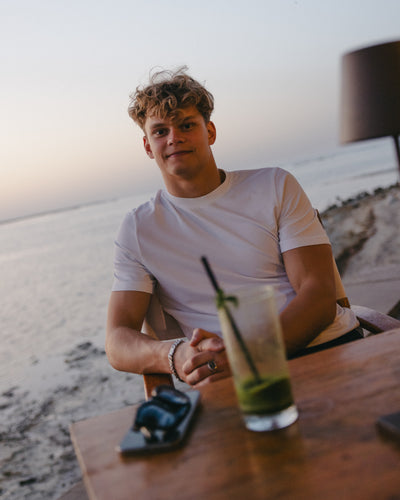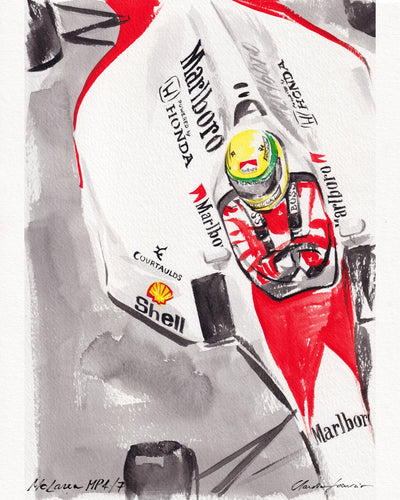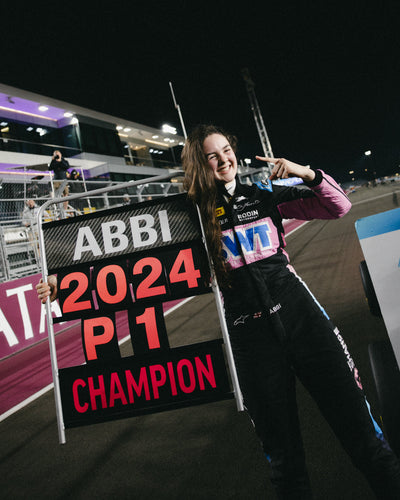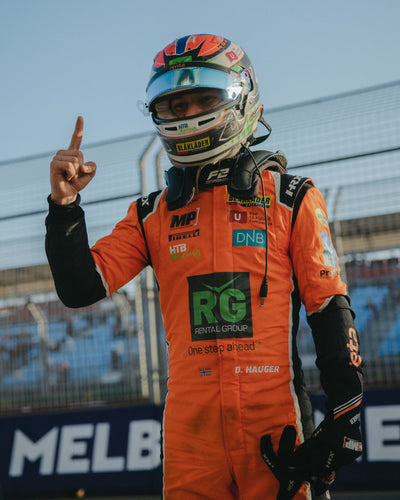We’ve spent a season following Paul Aron — from calm pre-race rituals to champagne-soaked podiums. In 2024, he raced in F2 with a quiet intensity, and now, as Alpine’s F1 Reserve Driver, Paul steps into a new chapter. Serious, with a side of mischief — we’ve shot his races, designed merchandise together, and recently sat down to talk life on and off track. Here’s Paul, in his own words.

Lids: Alright please set the scene for us, Paul…
Paul: We’re in Bahrain for round three of the Formula One championship. We’re sitting by the sea at a restaurant near the Bahrain Fort—don’t ask me the name—and were just catching up over lemonades after taking a few photos.
Lids: Do you usually explore the cities when you're at races?
Paul: I always try to. Early in the week we usually have some time off before things start on Thursday, so I use that time to see the place. In Formula 2 last year, my trainer and I tried to do that. We even flew to Melbourne a week early and stayed a week after to train and explore—we booked Airbnbs and really soaked it in. We went to Bells Beach during the World Surf League. I surf myself—not very well, there are no waves in Estonia—but I try when I get the chance, so it was cool to watch the competition.
It’s harder during the European races because we go back to the team in between for simulator work; we’ll arrive on Wednesdays and only have one day. But for flyaway races like here in Bahrain, we often get a bit more time.
Lids: How’s this season been for you so far?
Paul: It’s very different. I’ve raced every year since I was seven, and now I’m not driving. So even though I’m still training and preparing, it’s harder to stay motivated without a race ahead. But I know that if I don’t use this time well and a chance comes, I’ll regret it. So I’m staying focused, learning as much as I can, and also making time for family and friends. Being part of the F1 paddock is amazing—I used to look up to it from F3 and F2—but of course, the goal is to be in the car, not just watching.
Lids: And as a reserve driver, are you learning a lot?
Paul: I think you can learn as much as you are willing to. It’s easy to lose motivation in this role because you're not putting your learning to use. But I’m doing my best to stay sharp—listening in on driver briefings, learning how feedback is given, what to focus on. I take in everything I can so if I do get a shot, I’m ready. I also handle media and partner duties, which are important too—leaving a good impression matters. Honestly, you could slack off in this role, and get away with it. But that isn’t my style and I don’t want to waste this time. If an opportunity comes and I’m not ready, I couldn’t forgive myself.
Lids: When you're in those meetings, do you take notes or just try to remember everything?
Paul: It depends. I haven’t taken many notes this year because normally I write things down to prepare for driving—and I’m not driving right now. But it’s probably a good idea to start summarising the main points after each weekend. All the info is documented in slides and files, but a personal summary might be helpful in case I get a chance to drive next year.
Lids: How important is it to have good people around you? What’s it been like working with your brother Ralf and your performance coach Karl?
Paul: You can’t make it to the top alone. For me, it’s my family and my trainer, Karl. He used to work with my brother too, so he’s been part of the family for a while now. My brother, Ralf, managed me all the way through Formula 2, and having someone who’s raced themselves is a huge help. Karl’s been with us five or six years, so he feels like family too. Motorsport can be political, and it’s hard to fully trust anyone you’re competing against. So having a few people you know are 100% in your corner—that’s everything. And being Estonian, it’s nice to speak your own language. It makes you feel more at home and more like yourself. I really believe the people around you shape your career, so I try to surround myself with those who push me to be better.
Lids: You mentioned Melbourne earlier—has that been your favourite place to travel to?
Paul: Definitely. It was my first time in Australia (during F3), and my parents came too. They stayed an extra three weeks to explore. Australia has this mix of US energy and European style—it felt familiar but different. The people were super friendly, the climate was great, the city was full of cool cafes and places to train, and the track is amazing. I loved it.
Lids: Anywhere else that’s stood out recently?
Paul: Miami was great this year. Growing up in Estonia, everything you see in movies and media makes the US feel like a dreamland, so it was fun to experience that. It was only my second time in the States. In Europe, Monaco is obviously iconic—it feels like the heart of European racing. It’s beautiful, but during race week it’s so intense and I wouldn’t want to stay there long. In cities like Melbourne or Miami, the race is just a part of the city—you leave the track and return to normal life. I like that balance.
Lids: Any unexpected places you've liked?
Paul: Qatar, actually. It’s now one of my favourite tracks, and I had a really strong weekend there, so maybe I’m biased. But everything was just so convenient—the airport, hotels, even getting to the track. It was peaceful, no traffic, good cafes. If you’re just there to race, it’s the perfect setup. Super efficient.
Lids: You’re a coffee guy—found any standout spots on your travels?
Paul: I never remember the names, but yeah, we always hunt for good coffee. First day in a new city, Karl and I usually go for a run with no plan—just explore. Then we find a cool cafe, have a coffee and some food, and figure out the rest of the day from there. That’s kind of our ritual.

Lids: That sounds nice. Sorry to jump back to racing, but you mention Qatar—can you just touch on your highlights from last year?
Paul: Qatar was definitely one of the biggest highlights. It was my first win in F2—and in the end, the only one—which still surprises me because we were so close to winning so many times. When it finally happened, it was such a big moment. We'd spent the whole year being quick and having the pace, but just couldn’t quite get the win. That was the penultimate round, and I remember thinking, I can’t imagine finishing this season without a win. So when it finally came in Qatar—and in such a dominant way—it meant a lot. We were quickest in practice, in qualifying by quite a margin, and then won the feature race on Sunday. My whole family was there, too, which made it even more special.
On top of that, we launched our merch collaboration that weekend—it sold out in something like eight minutes, right? And I got announced as an Alpine Reserve Driver. So yeah, it was about as big a weekend as you could ask for.
Another highlight was Melbourne. I finished second, and I honestly think we could’ve won it if not for a really lucky pit stop for another driver. But beyond the result, I just loved the whole experience. We went a week early to explore, had a great race weekend, and then stayed a week after to see even more. It felt like a proper adventure.
Another big highlight was just the start of the year. I’d come off a tough end to my F3 season—we’d ended the relationship with Mercedes, and I didn’t have a clear path forward. The budget was tight, and it was uncertain if I’d even get a seat in F2. Then I signed with Hitech, and to be honest, we both struggled a bit at first. Winter testing wasn’t easy. But somehow, from the first round onward, we started racking up podiums—seven in a row to start the season—and we were leading the championship. That was probably the most meaningful stretch of the year. After all the uncertainty and the grind, to come out of the gate like that was surreal. It felt like a dream start, and it was satisfying to see the work pay off—for me and for Hitech. We both came into that year from tough places, and we really helped each other succeed.
Lids: How would you describe your friendships in the paddock? Is it easy to be friends with people you're also competing against?
Paul: Honestly, I’ve said this before—I don’t think a racing driver can have a true friend in the paddock. In sport, especially when you're directly competing, it’s almost impossible. A true friend is someone you can rely on, someone you can be completely honest with, someone who's there no matter what. I’ve got people like that in Estonia—friends who’ve been with me forever and who don’t care how I perform or what team I’m in. That kind of trust is rare, and it’s something I value a lot.
Inside the paddock, of course, there are people you get along with. The ones I connect with best are usually those who know how to separate the racing from everything else. I’m a hard racer—when I’m on track, I’m there to do my job, to get the best result for myself. That’s what we’re all doing. So if someone can’t separate that from how we interact off track, it’s hard to have a relationship.
But people like Dino Beganovic and Gabriel Bortoleto—I’d say we’ve managed to keep good relationships over time. I was teammates with Dino for two years in Formula Regional, and we probably raced each other the hardest. But once we got out of the car, our relationship stayed the same. Still, even then, we don’t tell each other everything. There are always some secrets because you’re still competing. So no, I wouldn’t say I have a true friend from the paddock—but I do have people I respect, get along with, and can laugh with outside the car. That’s already a lot.
Lids: Do you think it's important to have a life and identity outside of racing?
Paul: I think it depends a lot on the person. The best example of the opposite approach is probably Max [Verstappen]—he spends almost every minute of his life doing something racing-related. If it’s not Formula 1, he’s in a GT car, or doing sim racing. He’s fully immersed. But even Max has said in interviews that he values time with his family and loved ones. His mindset, at least from what it sounds like, is that he's giving racing everything right now—and then one day, he’ll stop completely and shift focus to family.
He mentioned once that sometimes his parents call and he doesn’t even have time to talk to them—and that eventually, those people won’t be around forever. So even though he's all in right now, he clearly sees the importance of life outside racing too.
Other drivers try to strike more of a balance—they mix things in and try to maintain some sort of life beyond the paddock. And for me, it’s really about what works for the individual. Even in other sports—take basketball for example—you had someone like Michael Jordan who was 100% focused and dominated. Then you had Dennis Rodman, who partied, traveled, lived wildly outside the game, and still competed at a crazy high level. And people around him said that letting him be free actually helped him play better.
So yeah—people are different. Personally, I try to find some kind of balance. Family, friends, and the people close to me matter a lot. I spend most of my time with them when I’m not racing, just making sure those relationships are strong and healthy.
Outside of that, I’m really happy with the life I have now. I love the lifestyle of racing—it suits me. I like to be fit, I enjoy training, I eat healthy, I travel, I meet new people, and I learn how to work with different personalities. All of that comes with racing anyway, and I genuinely enjoy it. The only hard part is time away from family and friends, but so far I’ve been able to manage it.
Before F2, I was also doing school full-time alongside racing, which was really tough. It meant I didn’t have any free time—I was either at school or on the track. And that’s when relationships started to suffer. So where I am now, I feel like the balance is much better. In the future, I’m sure other interests will come in, but right now, I’m 100% committed to racing—and happy.

Lids: What would you say is your best personality trait?
Paul: As a driver, I’d probably say discipline. Coming from a small country, I’ve had to work for every opportunity. Nothing was ever handed to me. I wasn’t a prodigy, I didn’t get special treatment—I had to earn every step forward.
And through most of my junior career, I did school full-time alongside racing—not online school or some special program like many others do. I went to a normal school, with normal classmates, and had to manage everything like anyone else. That forced me to be disciplined, because without it, I’d have failed at both.
I don’t think I’m the best, but I believe in hard work. I think with enough of it, you can always improve, and I don’t see a limit to that. You can always get better if you’re willing to put in the work.
I also genuinely love what I do. When I show up at the track, I think it’s obvious to the team that I’m happy to be there. And I think that energy is important—it helps bring everyone up. If you're leading a team, you need to inspire and motivate, and that starts with showing you're passionate.
In my personal life, I think my best trait is self-awareness. I try to live rightly—by my values, by logic, by relationships. I’m not perfect, but I try to be mindful of how I act. If I mess up, I want to learn and do better next time. And if I feel good about my actions, then I’m content with that. I’m always open to hearing different perspectives. To me, values and morals are key—if I’m living by them, I feel like I’m on the right path.
Lids: You dress well—is that something you’re into outside of the car?
Paul: Yeah, for sure. I think in racing, you have to be careful about how you talk about interests outside of the sport—people sometimes assume that if you care about style or something else, your mind isn’t 100% on racing. But I do have my own taste. I know what I like, and I don’t really care what other people think about it.
I like to look good and take care of myself. I buy clothes that I like, and I wear them because they make me feel good. But I’m also practical. I won’t wear something just because it looks cool—if it’s uncomfortable or impractical, I’ll go with what works better.
At the track, I keep it really low-key. I wear team gear, comfortable stuff, because I’m there to work. I don’t want anyone thinking I’m focused on anything other than racing. But outside the track, yeah—I enjoy wearing cool, stylish clothes.
My style’s mostly simple and classy—monotone colors, earthy tones. Lots of black, white, grey, navy, maybe some dark or light green. And sometimes, just for fun, I’ll wear something baggier or more street style. So yes, I care about how I dress—but I try to keep my racing life and my personal life separate.
Lids: Are there any people in racing who inspire you?
Paul: People who are great at what they do. I don’t have just one role model—everyone has different strengths and weaknesses, and I try to learn from all of them. Anyone who’s doing their thing with passion and doing it well, that inspires me.
In F1, there are guys like Max, Piastri, Lewis—top guys in different ways, and I try to take something from all of them. Growing up, of course, I looked up to my older brother—he was my big brother, and that was enough. And there are people outside of racing, too, who I think are doing really cool things with their lives. So yeah, I just pay attention to people who put heart into what they do and do it well. There’s always something to learn from them.
Lids: What are you watching, reading, or listening to at the moment?
Paul: There’s a sports psychology book I’ve read three times now—might even start it again soon. I won’t say the name, but it’s helped me so much mentally. It has everything I need to keep my mindset sharp. Every time I finish it, I start again, because those reminders are important—and easy to forget.
Music-wise, lately I’ve been into really smooth, classy stuff. Not sure what genre exactly—just very chilled, elegant music. I’ve been feeling pretty relaxed recently and that kind of vibe fits.
And as for watching things… honestly, nothing. I haven’t had time for series or shows. Most of my time is spent training or with people close to me. But yeah—not watching anything right now, and that’s probably a good thing.
Lids: Lastly Paul, is there a new skill or something in life you’d love to learn?
Paul: Languages—definitely. Of course, there are other things I’d love to do, like surf or get better at certain hobbies. But the first thing that comes to mind is languages.
Being Estonian, I speak Estonian and English fluently—but that’s it. And in racing, with so many nationalities around, being fluent in French, Spanish, or Italian would help a lot. So if I could just choose a skill right now, I’d want to be fluent in those three languages. It would make a huge difference—not just in communication, but in connecting with more people on a deeper level.


